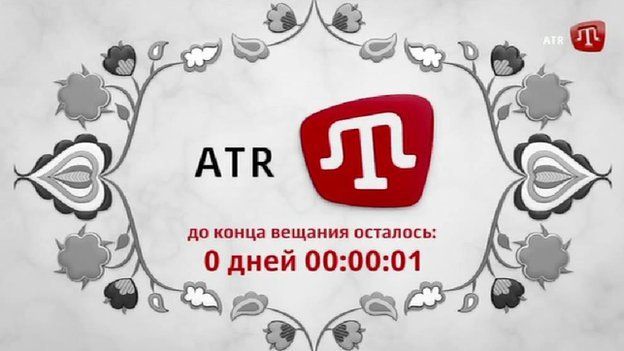Crimean Tatar media 'silenced by Russia'
- Published

Media serving the ethnic Tatar minority in Russian-occupied Crimea have shut down after failing to register with the new pro-Moscow authorities.
There are accusations that the Kremlin is silencing a group often critical of its actions.
Many in the mainly Muslim Tatar community distrust the new administration, installed when Russian troops and local paramilitaries annexed the Ukrainian region a year ago.
At the stroke of midnight on 31 March the most popular Crimean Tatar television station, ATR, went off the air. Since October it had been trying to obtain a new broadcasting licence, demanded by the new administration, but to no avail.
Ahead of the 1 April deadline, the channel broadcast live talk shows called "Don't kill ATR". As the final minutes elapsed, the channel bade an emotional farewell to its viewers. "Those who decided to shut down ATR are targeting the whole of our people, not just the TV station," the presenter said.
Most of the local media in Crimea strongly support the Russian annexation, and most have been registered by Russia's media regulator Roskomnadzor. But it appears that ATR's fate was sealed well before the deadline.
Crimea's Kremlin-backed leader Sergei Aksyonov accused ATR of inciting discord. "The channel is whipping up tensions and creating a sense of insecurity in the public by raising hopes that Crimea will return to Ukraine," he told a meeting in Moscow. "It has been explained to ATR's management that such channels cannot operate in our republic in this time of semi-war."
In 2014, ATR ran strongly pro-Ukrainian coverage of the events leading up to Crimea's annexation. Once the new pro-Kremlin administration took charge, ATR received a formal warning over "extremist activities" and somewhat toned down its rhetoric. Although the channel was still fairly critical, it avoided terms like "annexation" and "occupation".
Other media owned by the channel's founder, Crimean Tatar businessman Lenur Islyamov, also failed to obtain Russian licences and suspended their operations on 1 April. They include Meydan radio, Russian-language Lider FM and even the children's entertainment TV channel Lale.
The well-established Crimean Tatar news agency QHA did not receive a licence either, and announced that it is moving to Kiev.
Avdet newspaper had its application refused, after almost 25 years of publication. The paper's chief editor, Shevket Kaybullayev, is defiant and says he will try to continue publishing the paper "despite risking arrest".
The authorities' failure to register the Crimean Tatar media caused outrage among Crimean Tatars and freedom of speech activists.
"It's a targeted strike carried out by the occupation authorities to fully suppress and disorient the Crimean Tatar people," said Refat Chubarov, the exiled head of the Crimean Tatar government (Mejlis).
Speaking to the BBC from the Ukrainian capital, Kiev, he described ATR as the only remaining "relatively impartial" TV channel in Crimea, as well as a bastion of Crimean Tatar culture.
London-based rights group Amnesty International was equally blunt. "This blatant attack on freedom of expression, dressed up as an administrative procedure, is a crude attempt to stifle independent media, gag dissenting voices, and intimidate the Crimean Tatar community," it said in a statement.
The pro-Russian administration of Crimea denies there is any political agenda behind the move. "They are making mistakes deliberately to create conflict around the channel," said Mr Aksyonov.
Since Crimea's annexation by Russia, at least one local journalist has been charged with trying to overthrow the new administration - a crime punishable by up to five years in jail. Several others have been questioned by the security services or had their houses searched. Still others left Crimea, fearing persecution.
The two most respected Crimean Tatar leaders - Refat Chubarov and his predecessor as Mejlis chief, Mustafa Dzhemilev - are now based in Kiev, after the Russian authorities banned them from visiting the region.
A number of Crimean Tatar activists have been physically assaulted and several have disappeared.
They still remember how Stalin deported almost all Crimean Tatars to Central Asia and Russia in 1944, when Soviet forces were fighting Nazi Germany. Crimean Tatars are now believed to comprise about 12% of the local population.
BBC Monitoring reports and analyses news from TV, radio, web and print media around the world. For more reports from BBC Monitoring, click here. You can follow BBC Monitoring on Twitter and Facebook.
- Published9 March 2015
- Published16 March 2015
- Published21 June 2023